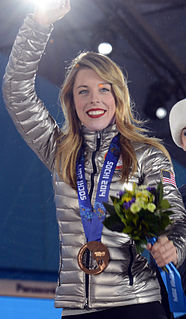A Quote by Amandla Stenberg
Yes, there's something dangerous about turning people into token social activists. I was thinking about this recently with our pop-culture feminism, when feminism is such a buzzword in the media now. We're covering it in a way that we haven't before, but also in a way that's way more surface level. And while I think that there's some danger in that, I also think it's a great gateway for some people.
Related Quotes
Spaces of liberation are, in a certain way, some kind of social spaces where people can not only get together and think about something else, but also act together. If you are thinking about an elemental solidarity, you are thinking about people acting together and taking decisions together, and thereby beginning to think about what sort of society they want to create. So, there is a need for liberated spaces; that is really difficult.
You'll also hear about the widening gap in the educated and the uneducated. The liberals will all say, "We must do something about it" and some in our population swoon, "Oh, yes, it's so unfair, and so unfortunate, and we've gotta do something about the inequality." So the Democrats then have their reason to do something about it, and the way they go about it is not trying to make people equal at all. The way they go about it is not even rooted in changing inequality, at the end of the day. The way they go about it is destructive for everybody.
In terms of feminism, I would just ask young women to keep an open mind about it and try to learn about it before they write it off or believe the negative stereotypes that surround it. Feminism can help you on a personal level, it can offer you an incredible community of brilliant and impassioned people, and can change the way you see the world if you just open yourself up to it. I think that goes for all causes as well.
When I grew up, feminism wasn’t something that was really talked about. There’s a really negative stereotype about feminism in the media. That really plays badly for young women understanding the movement. Maybe people don’t want to identify themselves as feminists because of the label. But people need to understand what feminism means and educate themselves before they reject it.
As all advocates of feminist politics know most people do not understand sexism or if they do they think it is not a problem. Masses of people think that feminism is always and only about women seeking to be equal to men. And a huge majority of these folks think feminism is anti-male. Their misunderstanding of feminist politics reflects the reality that most folks learn about feminism from patriarchal mass media.
If you ask me what I believe in today, I believe in feminism. I believe that all human beings are equal. I believe that no one has the right to authority over anyone else. Feminism has to do with everything in the world, a vision of how the world can be. I have great doubts about Utopias, but I just keep on thinking there is a better way to live than the way we live now.
I think feminism has always been global. I think there's feminism everywhere throughout the world. I think, though, for Western feminism and for American feminism, it not so surprisingly continues to center Western feminism and American feminism. And I think the biggest hurdle American feminists have in terms of taking a more global approach is that too often when you hear American feminists talk about international feminism or women in other countries, it kind of goes along with this condescending point of view like we have to save the women of such-and-such country; we have to help them.
The women's movement gave me a set of tools to think about things like my body and how people react to me and the way that my dating life was going. It's a very practical movement - yes, it's about issues like how we can get more women MPs elected, but it's also about how feminism affects things like your relationship.
There are so many things that we have to be very concerned about. But I always come back to feminism. People look at me sideways now and are like, "With everything going on, the destruction of the environment, these endless wars, this capitalism that has a stranglehold on our culture and our world and you're talking about feminism still?"
I think all writing is about writing. All writing is a way of going out and exploring the world, of examining the way we live, and therefore any words you put down on the page about life will, at some level, also be words about words. It's still amazing, though, how many poems can be read as being analogous to the act of writing a poem. "Go to hell, go into detail, go for the throat" is certainly about writing, but it's also hopefully about a way of living.
Many activists just see what's wrong: they want to stand up to injustice and educate people about it. But I think it's equally important for activists to hold a more positive vision of what's right with their country: what's going well, and what they'd like to grow or see more of. I also like to encourage activists to take some time each day to sit silently or take a walk in nature as a way to be in touch with their inner wisdom and peace - and to remember why they are on this path in the first place.

































